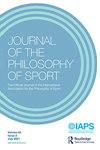民主、哲学和体育:激发斗争精神
IF 1.7
3区 哲学
Q3 ETHICS
引用次数: 1
摘要
民主、哲学和体育这三种社会实践比我们最初想象的更加相似。它们可以被描述为“本质上是竞争的社会实践”,也就是说,它们是“竞争”(agon)的表现。参与对抗社会实践的可能性来自人类的条件,即来自关心自己存在的必要性,这需要持续的关注和决策,有时意味着与他人对抗。我们用古希腊术语“polemos”(斗争)来称呼人类生存的这种特征,它可以通过各种类型的斗争来表现。如果社会珍视竞争的社会实践,它就会使其公民能够以尊重、和平和富有成效的方式竞争,以证明自己和实现目标(例如,通过有说服力的论点,或在体育运动中获胜)。据信,agon在古希腊发挥了重要作用,在哲学、民主政治和体育运动中,agon以智力和身体的形式出现,这表明这些实践之间的关系根深蒂固,意义重大。本文探讨了发展我们对斗争和斗争的理解可以增强我们对斗争社会实践的经验,使我们的存在以一种更自由、更亲社会和更丰富的方式进行。本文章由计算机程序翻译,如有差异,请以英文原文为准。
Democracy, philosophy and sport: animating the agonistic spirit
ABSTRACT The three social practices – democracy, philosophy and sport – are more similar than we might initially suspect. They can be described as ‘essentially agonistic social practices’, that is, they are manifestations of ‘agon’ (contest). The possibility to participate in agonistic social practices derives from the human condition, i.e. from the necessity to care for one’s existence, which requires ongoing attention and decision-making, and which sometimes means going against others. We call this character of human existence by the ancient Greek term ‘polemos’ (struggle), which can be manifested through various types of agon. If society cherishes agonistic social practices, it enables its citizens to compete to prove themselves and achieve goals (e.g. to push through a persuasive argument, or to win in sport) in a respectful, peaceful and productive way. Believed to have played a significant role in ancient Greece, agon presents itself in both intellectual and physical forms – in philosophy, democratic politics and sport – suggesting that the relationship between these practices is deep-rooted and significant. This paper explores the idea that developing our understanding of polemos and agon can enhance our experience of agonistic social practices and enable our existence to proceed in a more free, pro-social and enriching way.
求助全文
通过发布文献求助,成功后即可免费获取论文全文。
去求助
来源期刊

Journal of the Philosophy of Sport
Multiple-
CiteScore
1.90
自引率
14.30%
发文量
24
期刊介绍:
The Journal of the Philosophy of Sport (JPS) is the most respected medium for communicating contemporary philosophic thought with regard to sport. It contains stimulating articles, critical reviews of work completed, and philosophic discussions about the philosophy of sport. JPS is published twice a year for the International Association for the Philosophy of Sport; members receive it as part of their membership. To subscribe to either the print or e-version of JPS, press the Subscribe or Renew button at the top of this screen.
 求助内容:
求助内容: 应助结果提醒方式:
应助结果提醒方式:


